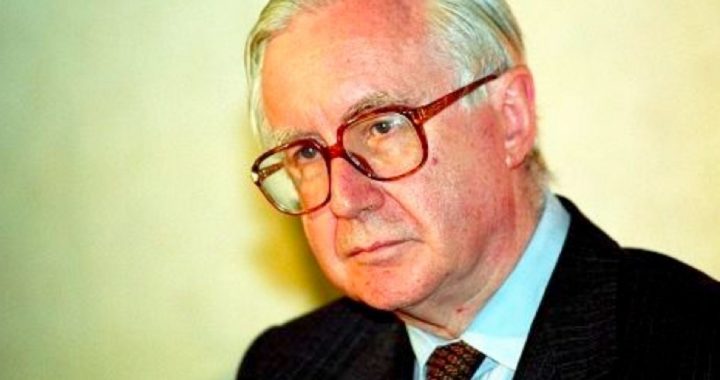
With the passing of British writer The Right Honourable The Lord Rees-Mogg, a voice that for more than 60 years resonated in the freedom firmament was stilled.
Upon graduation from Oxford in 1951 (as president of Oxford Union), William Rees-Mogg began his journalism career at The Financial Times in 1952. He moved to the Sunday Times in 1960, where he became editor in 1967, serving until 1981. He left the Times after the paper was purchased by Rupert Murdoch, returning years later as an occasional columnist on current affairs.
He co-founded Newsmax Media with James Dale Davidson and Christopher Ruddy in September 1998, along with investors including family members of the late CIA Director William J. Casey. Davidson, who co-authored several books with Rees-Mogg, including The Sovereign Individual, The Great Reckoning, and Blood in the Streets, was the founder of the National Taxpayers Union, and noted that Rees-Mogg was actively engaged until the end:
For a senior figure in the establishment, Lord Rees-Mogg was a remarkably open-minded libertarian and I would say something of a free spirit…
I saw Lord Rees-Mogg for lunch just several months ago in London. As always he was sharp, questioning me about the upcoming American election and giving [me] his take on world events and the global economy. His mind never slept.
Ruddy added: “My friend was not only a remarkable journalist, but a man of value who lived for something larger than himself, who wanted Britain to remain strong and relevant, and as a helping hand to the other country he loved, the United States.”
Louis Heren, the Times’ foreign correspondent for his entire career, knew Rees-Mogg well in his position at the paper as editor, and said that Rees-Mogg used it to “thunder … on almost every political and economic issue.”
In The Great Awakening, Rees-Mogg and Davidson thundered in 1991 about the coming recession that overtook the American economy just nine years later with the bursting of the dot.com bubble in March, 2000, when the NASDAQ peaked at 5,132 (at this writing it remains at just 3,000).
In The Sovereign Individual, Davidson and Rees-Mogg thundered once again, this time in 1999, about the coming internet revolution that they called “the fourth stage of human society,” predicting that it would shake the very foundations of the power and influence of governments around the world. A review by Publishers’ Weekly said that the authors posited that “the … revolution will subvert and destroy the nation-state” … and that “the next millennium will see an enormous decline in the influence of politicians, lobbyists, labor unions and regulated professions as new information technologies democratize talent and innovation and decentralize the workplace.”
In March, 2009, Rees-Mogg thundered about paper money masquerading as real money in an article at LewRockwell.com:
In extreme circumstances, paper money can lose all its value, [while] gold is still acceptable as payment.
In 1940, when the French Army was defeated, many French people took to their automobiles to escape the advancing Germans. They found that petrol stations would not accept paper francs, but would sell their petrol [only] in exchange for gold coins….
We need … to have permanent money, which can be relied upon to survive…. The historic value of gold has been astonishingly stable over centuries.
He foresaw the time when paper money, and its cousin, digital money, would be replaced with real money, just as it had been in the past:
This [present system] is a system which could be blown away because there is nothing in it to gain confidence. Even a return to paper money would raise the level of reality attached to world currencies. There is a problem of raising the reality level of all currencies — a problem which nineteenth century economists solved by convertibility to gold.
Ruddy added, when learning of Rees-Mogg’s passing:
He knew many of the great figures of his time, but was by no means persuaded that all was right with the world.
He was a very good writer. I will miss him.
Using his considerable influence as editor at the London Times and thereafter, he helped to blaze a trail into the future that has made the efforts and voices of others in the freedom firmament more credible, effective, and persuasive. Indeed, he will be missed.
A graduate of Cornell University and a former investment advisor, Bob is a regular contributor to The New American and blogs frequently at www.LightFromTheRight.com, primarily on economics and politics. He can be reached at [email protected]
Photo: Lord Rees-Mogg



